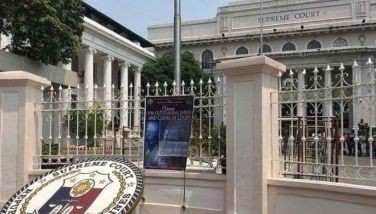WHO warns public vs iodized salt overdose
MANILA, Philippines - Too much can be deadly.
The World Health Organization (WHO) yesterday warned against excessive intake of iodized salt against radiation sickness.
“It is dangerous to take large amounts of iodized salt in order to increase the amount of stable iodine in the body. Increasing one’s daily intake of iodized salt will cause more harm than good,” WHO said in a statement.
WHO issued the warning amid reports that some people still insist on ingesting excessive amounts of iodized salt against possible nuclear contamination from Japan.
WHO pointed out that sodium chloride is acutely toxic in large amounts and even tablespoon quantities of salt repeatedly taken over a short period of time could cause poisoning.
Iodized salt is one of the more common forms of iodine aside from those found in disinfectants, antiseptics and water-sterilizing solutions.
Based on research, the recommended amount of iodine for adults is about 150 micrograms per day while children need between 70 and 150 micrograms of iodine per day.
Pregnant women only need 175 micrograms of iodine per day, while lactating women need 200 micrograms per day.
WHO stressed that iodized salt and other forms of iodine cannot be taken as alternatives to potassium iodide pills as a way to counter radiation effects.
“Other products that contain iodine, other than medicines, should not be taken unless it is recommended by public health authorities,” WHO pointed out.
There were fears of a possible spillover of the nuclear radiation reaching the Philippines due to the continuous worsening condition of the nuclear reactors of the damaged Fukushima Daiichi nuclear complex.
Japanese authorities have advised ingestion of potassium iodide in a bid to protect themselves against thyroid cancer in the case of radioactive exposure in a nuclear accident but only for people living within the plant’s 30-kilometer zone.
But local health officials said the Philippine government is not going to purchase and distribute potassium iodide to the public since the country is safe from effects of the nuclear radiation.
The Department of Science and Technology (DOST) also has not recommended detailed checks of food imports from Japan.
Science Secretary Mario Montejo maintained over the weekend that the current levels of radiation in Japan pose no threat to the Philippines.
According to reports, the Japanese government had found higher than normal levels of radioactivity in spinach and milk at farms up to 90 miles away from the earthquake-hit power plants.
“None yet, but we will evaluate latest data tomorrow (Monday) and give advice and bulletin,” Montejo said.
DOST’s Science and Technology Information Institute director Raymund Liboro said there is no immediate threat of radiation to the Philippines.
“Reports indicate effects remain local to Japan and no foreseeable transboundary effects to the Philippines,” he said.
The DOST’s Philippine Nuclear Research Institute (PNRI) also did not issue an Emergency Response Bulletin yesterday. Its latest bulletin was issued at 2 p.m. last Saturday.
Liboro said the DOST-PNRI would release today the next bulletin on Japan’s nuclear accident.
“Hopefully it would be our last (bulletin),” Liboro said.
Reports said Shanghai authorities have ordered detailed checks of imports from Japan for radioactivity as radiation levels in samples of milk and certain vegetables near a quake-crippled nuclear plant in Japan have been found to exceed Japanese government safety limits.
The Shanghai Entry-Exit Inspection and Quarantine Bureau placed the announcement on its website earlier on Wednesday but later removed it, reports said.
The pressure reportedly rose again in one of the reactors of the power plant over the weekend.
Reports said efforts to put water in the Unit 3 reactor at the Fukushima Daiichi complex might not have been working and this means that radiation levels around the plant will increase again.–With Helen Flores
- Latest
- Trending





























